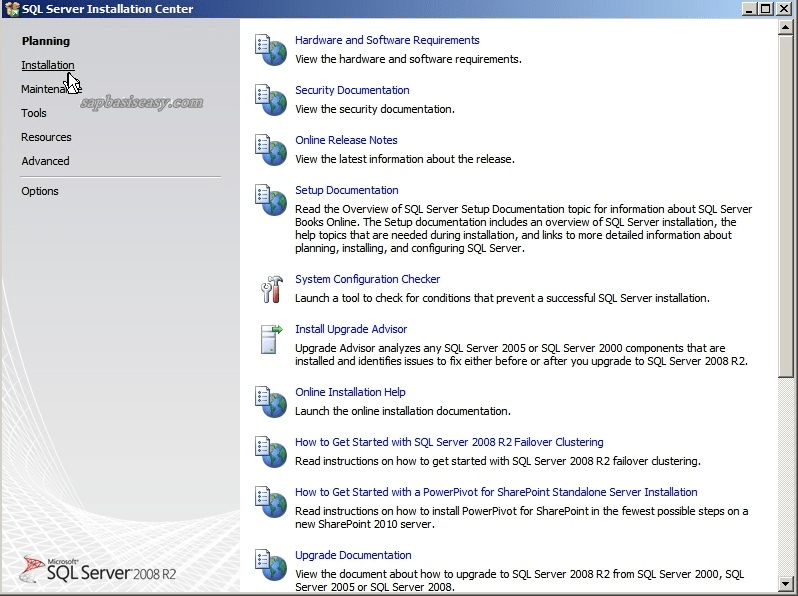In this article I’ll show you step-by-step how to Install SAP SQL Server 2008 R2 Instance on SAP Windows Server environment. The sequence of installation to build your SAP system Landscape in Windows is (the installation sequence is slightly different when you do in UNIX/LINUX):
1. Install SAP Database Software (Oracle/SQL/MaxDB//DB2)
2. Install SAP Central System (DB Instance/ASCS/CI)
or
1. Install SAP Database Software (Oracle/SQL/MaxDB//DB2)
2. Install SAP Database Instance
3. Install SAP Central Instance
After that you can continue to do Install SAP Dialog Instance.
Before you are able to Install step 2 and 3 above you have to finish installing a database software first. In this example i use MS SQL Server 2008 R2 as database software on Windows Server 2008 R2.
You can install it in unattended mode using SQL4SAP.vbs script provided or install it manually.
By using script you don’t need to choose many parameter, and the script will do everything.
I’ll show you both.
A. INSTALLING SQL Server 2008 R2 for SAP in unattended mode.
1. Locate your SQL server 2008 R2 RDBMS. Double-Click SQL4SAP.VBS
 |
| SQL4SAP.vbs |
2. On next screen you’ll be asked to enter DB SID, or leave it blank if you want to make it Default.
 |
| DB SID for SAP SQL Server Instance |
3. Choose NO to install in customized mode.
4. Click OK to start the installation.
 |
| Summary |
5. Make sure your installation is finished successfully.
 |
| SAP SQL installation is finished |
Now you’re ready to install SAP Central Instance or SAP Database Instance.
B. INSTALLING SQL Server 2008 R2 Manually.
1. Before you are able to install SQL Server 2008 R2 you have to install .NET Framework first, using command:
#servermanagercmd -install NET-Framework-Core
 |
| Install .NET Framework |
Make sure the installation is running
and make sure the installation is finished successfully
 |
| .NET Framework installed successfully |
2. Now you locate the setup.exe file in your RDBMS SQL (in folder x86-x64-IA64\EnterpriseEdition). Run as administrator.
 |
| Ready to install RDBMS SQL |
3. Choose Installation
 |
| Initial Screen |
4. Choose “New Installation …. ”
 |
5. Choose Run
 |
| Asking permission to run setup |
6. Choose OK on next screen. If there’s failed operation or warning then check it.
 |
| Setup Support Rules |
7. Enter the product Key.
 |
| MSSQL Server 2008R2 Product Key |
8. Accept the License Terms
 |
| MSSQL Server 2008R2 License Term |
9. Choose Install on “Setup Support Files”
 |
| MSSQL Server 2008R2 Support File |
10. Installation in progress
Check for failed operation or warning.
11. Choose “Feature Installation”
 |
| MSSQL 2008 R2 Feature Installation |
12. Select all features, except:
- Replication Services / SQL Server Replication
- Analysis Services
- Reporting Services
- Integration Services
- Microsoft Sync Framework
Choose Next
 |
| MSSQL 2008 R2 Feature Installation |
Check for failed installation or warning.
13. Put your Database SID and folder installation.
 |
| MSSQL 2008 R2 Database Instance |
On next screen will show you the space requirement
Choose Next
 |
| MSSQL 2008 R2 space requirement |
14. Choose Local User to startup SQL Server Service
 |
| MSSQL 2008 R2 Service |
15. Choose “SQL_Latin1_General_CP850_BIN2” for collation.
 |
| MSSQL 2008 R2 Collation |
Make sure the correct collation is chosen.
16. Choose Next for Error Reporting
 |
| MSSQL 2008 R2 Error Reporting |
17. Check for failed operation and warning.
18. Now Ready to Install
 |
| Ready to install MSSQL 2008 R |
19. Installation is in progress
 |
| MSSQL 2008 R2 in progress |
Make sure the installation is completed successfully
 |
| MSSQL 2008 R2 is completed |
20. Now you have to run some configuration, go to “SQL Server Configuration Manager”
21. Expand SQL Server Network Configuration –> Protocol for TRN
Choose “Named Pipes” –> Enable
Choose OK.
22. Restart the SQL Server service.
23. Now go to “SQL Server Management Studio”
24. Choose SQL Server Agent Properties
Change:
history log size to 5000
history rows per job to 1000
Tick “Remove agent history” and choose the appropriate time
Now you have finished your Database Instance Installation, and ready to Install SAP Central System or SAP Central Instance.

















1 thought on “How to install SQL Server 2008 R2 for SAP”